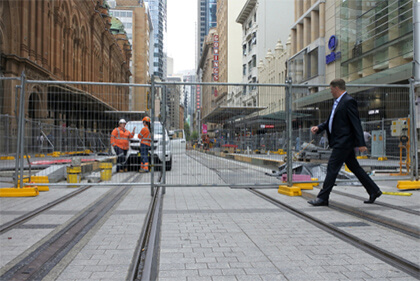PEDESTRIAN SLIP, TRIP AND FALL ACCIDENTS – THE RESPONSIBILITY OF PUBLIC AUTHORITIES
If you have worked, lived or visited Sydney since October 2015, you will know of the light rail construction in the Sydney CBD. Since its construction there have been a number of slip, trip and fall accidents along the trackwork.
The question we seek to answer is, what are the obligations of public authorities for slip, trip and fall accidents, such as those that have occurred along the Sydney light rail tracks.
Claiming compensation for an injury in NSW is not a simple process. We have a fault based, adversarial system. You must show on the balance of probabilities that another party was negligence and that their negligence caused your injury.
Slip, trip and fall accidents in a public area have an added layer of complexity because a public authority has different obligations and defences that are not available to the common defendant.
What is a public authority?
Public authorities are defined by the Civil Liability Act 2002 (NSW) (“the Act”) to include bodies such as (see Section 41):
- The Crown
- A Government Department
- A public health organisation
- A local council
A public authority owes the public a duty of care in certain circumstances. For example, when Transport for NSW performs work on George Street, they have a duty to ensure that the surface on which they are performing work is sufficiently slip resistant. In other words, a public authority has a duty to exercise its powers in a way that is lawful and not negligent.
If a person slips on a surface and he or she can be prove that the surface was not sufficiently slip resistant, thy may be entitled to make a public liability claim against the responsible public authority on the basis that it breached its duty of care, or, in other words, exercised its power in a negligent way.
In those circumstances, a claimant would be required to prove the usual elements of a negligence claim including foreseeability, damages, remoteness and causation.
Public authorities, however, are afforded significant protections under the Act which has made it notoriously difficult for claimants to succeed in claims against them. In particular, a public authority can rely on the following principles in determining whether it has a duty of care or whether it has breached a duty (see Section 42(a)-(d) of the Act):
- Its financial and other resources reasonably available.
- The allocation of those resources by the authority is not open to challenge.
- The broad activities of the authority are to be considered when considering duty of care as opposed to just considering the function that gave rise to the alleged breach.
- The authority can rely on evidence of its compliance with general principles and applicable standards for the exercise of its functions as evidence of the proper exercise of its functions giving rise to the alleged breach.
Contractors
It is frequently the case that public authorities engage contractors to perform construction and maintenance work.
A public authority may allege that it has delegated its duty of care to the contractor. The extent to which a contractor may be liable will depend on the contract between the contractor and the public authority as well as the work the contractor performed.
At the commencement of a compensation claim an investigation must be conducted into the relationship between any contractor and the relevant public authority.
Stacks Goudkamp has run numerous successful claims against public authorities and their contractors. Through our investigations we have been able to establish that the relevant authority had knowledge of the risk and the harm it could cause, but failed to reasonably exercise their powers to prevent that risk from manifesting.
How do I get in touch with you?
For more information, and to arrange a free, no-obligation assessment of your claim, please call Stacks Goudkamp on 1800 251 800, or alternatively make an online enquiry.
Written by Alexander Morrison and Megan Sault.
Alexander Morrison is a Practice Group Leader specialising in motor vehicle claims and public liability claims that occur both within Australia and overseas.
Megan Sault is a Paralegal in Alexander Morrison’s Practice Group at Stacks Goudkamp.



